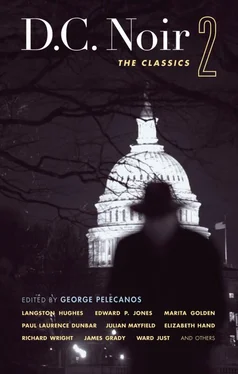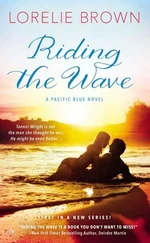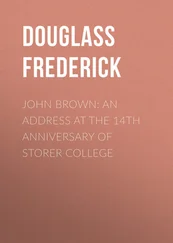One of the baby’s cries seemed to get stuck in his throat, and to release it the baby raised a fist and punched the air, and finally the cry came free. How does a man start over with nothing? Horace thought. Elaine came near him, and the baby still watched him as his crying lessened. How does a man start from scratch?
He leaned down and picked up a few of the broken albums from the floor and read the labels. “I would not hurt you for anything in the world, Horace,” Elaine said. Okeh Phonograph Corporation. Domino Record Co. RCA Victor. Darnell Jr.’s crying stopped, but he continued to look down at the top of Horace’s head. Cameo Record Corporation, N.Y. “You been too good to me for me to hurt you like this, Horace.” He dropped the records one at a time: “It Takes an Irishman to Make Love.” “I’m Gonna Pin a Medal on the Girl I Left Behind.” “Ragtime Soldier Man.” “Whose Little Heart Are You Breaking Now.” “The Syncopated Walk.”
Wonderwall
by Elizabeth Hand
(Originally published in 2004)
Hyattsville, MD
A long time ago, nearly thirty years now, I had a friend who was waiting to be discovered. His name was David Baldanders; we lived with two other friends in one of the most disgusting places I’ve ever seen, and certainly the worst that involved me signing a lease.
Our apartment was a two-bedroom third-floor walkup in Queenstown, a grim brick enclave just over the District line in Hyattsville, Maryland. Queenstown Apartments were inhabited mostly by drug dealers and bikers who met their two-hundred-dollars-a-month leases by processing speed and bad acid in their basement rooms; the upper floors were given over to wasted welfare mothers from P.G. County and students from the University of Maryland, Howard, and the University of the Archangels and St. John the Divine.
The Divine, as students called it, was where I’d come three years earlier to study acting. I wasn’t actually expelled until the end of my junior year, but midway through that term my roommate Marcella and I were kicked out of our campus dormitory, precipitating the move to Queenstown. Even for the mid-1970s our behavior was excessive; I was only surprised the university officials waited so long before getting rid of us. Our parents were assessed for damages to our dorm room, which were extensive; among other things, I’d painted one wall floor-to-ceiling with the image from the cover of Transformer, above which I scrawled, Je suis damne par l’arc-en-ciel, in foot-high letters. Decades later, someone who’d lived in the room after I left told me that, year after year, Rimbaud’s words would bleed through each successive layer of new paint. No one ever understood what they meant.
Our new apartment was at first an improvement on the dorm room, and Queenstown itself was an efficient example of a closed ecosystem. The bikers manufactured Black Beauties, which they sold to the students and welfare mothers upstairs, who would zigzag a few hundred feet across a wasteland of shattered glass and broken concrete to the Queenstown Restaurant, where I worked making pizzas that they would then cart back to their apartments. The pizza boxes piled up in the halls, drawing armies of roaches. My friend Oscar lived in the next building; whenever he visited our flat he’d push open the door, pause, then look over his shoulder dramatically.
“Listen—!” he’d whisper.
He’d stamp his foot, just once, and hold up his hand to command silence. Immediately we heard what sounded like surf washing over a gravel beach. In fact it was the susurrus of hundreds of cockroaches clittering across the warped parquet floors in retreat.
There were better places to await discovery.
David Baldanders was my age, nineteen. He wasn’t much taller than me, with long, thick black hair and a soft-featured face: round cheeks, full red lips between a downy black beard and mustache, slightly crooked teeth much yellowed from nicotine, small well-shaped hands. He wore an earring and a bandana that he tied, pirate-style, over his head; filthy jeans, flannel shirts, filthy black Converse high-tops that flapped when he walked. His eyes were beautiful — indigo, black-lashed, soulful. When he laughed, people stopped in their tracks — he sounded like Herman Munster, that deep, goofy, foghorn voice at odds with his fey appearance.
We met in the Divine’s drama department, and immediately recognized each other as kindred spirits. Neither attractive nor talented enough to be in the center of the golden circle of aspiring actors that included most of our friends, we made ourselves indispensable by virtue of being flamboyant, unapologetic fuck-ups. People laughed when they saw us coming. They laughed even louder when we left. But David and I always made a point of laughing loudest of all.
“Can you fucking believe that?” A morning, it could have been any morning: I stood in the hall and stared in disbelief at the department’s sitting area. White walls, a few plastic chairs and tables overseen by the glass windows of the secretarial office. This was where the other students chain-smoked and waited, day after day, for news: casting announcements for department plays; cattle calls for commercials, trade shows, summer reps. Above all else, the department prided itself on graduating “working actors” — a really successful student might get called back for a walk-on on Days of Our Lives. My voice rose loud enough that heads turned. “It looks like a fucking dentist’s office.”
“Yeah, well, Roddy just got cast in a Trident commercial,” David said, and we both fell against the wall, howling.
Rejection fed our disdain, but it was more than that. Within weeks of arriving at the the Divine, I felt betrayed. I wanted — hungered for, thirsted for, craved like drink or drugs — High Art. So did David. We’d come to the Divine expecting Paris in the 1920s, Swinging London, Summer of Love in the Haight.
We were misinformed.
What we got was elocution taught by the department head’s wife; tryouts where tone-deaf students warbled numbers from The Magic Show; Advanced Speech classes where, week after week, the beefy department head would declaim Macduff’s speech — All my pretty ones? Did you say all? — never failing to move himself to tears.
And there was that sitting area. Just looking at it made me want to take a sledgehammer to the walls: all those smug faces above issues of Variety and Theater Arts, all those sheets of white paper neatly taped to white cinder block with lists of names beneath: callbacks, cast lists, passing exam results. My name was never there. Nor was David’s.
We never had a chance. We had no choice.
We took the sledgehammer to our heads.
Weekends my suitemate visited her parents, and while she was gone David and I would break into her dorm room. We drank her vodka and listened to her copy of David Live, playing “Diamond Dogs” over and over as we clung to each other, smoking, dancing cheek to cheek. After midnight we’d cadge a ride down to Southwest, where abandoned warehouses had been turned into gay discos — the Lost and Found, Grand Central Station, Washington Square, Half Street. A solitary neon pentacle glowed atop the old Washington Star printing plant; we heard gunshots, sirens, the faint bass throb from funk bands at the Washington Coliseum, the ceaseless boom and echo of trains uncoupling in the railyards that extended from Union Station.
I wasn’t a looker. My scalp was covered with henna-stiffened orange stubble that had been cut over three successive nights by a dozen friends. Marcella had pierced my ear with a cork and a needle and a bottle of Gordon’s gin. David usually favored one long drop earring, and sometimes I’d wear its mate. Other times I’d shove a safety pin through my ear, then run a dog leash from it around my neck. I had two-inch-long black-varnished fingernails that caught fire when I lit my cigarettes. I kohled my eyes and lips, used Marcella’s Chloe perfume, shoved myself into Marcella’s expensive jeans even though they were too small for me.
Читать дальше











